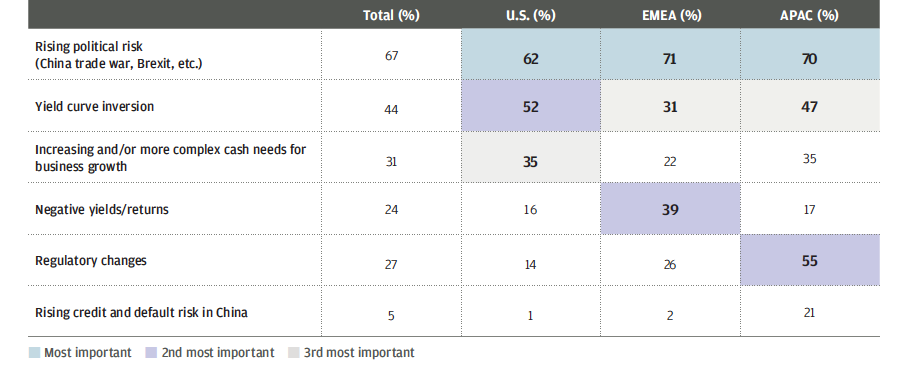
With responses gathered from 346 senior cash investors around the world, representing a combined cash balance of approximately USD 1 trillion, the latest J.P. Morgan Global Liquidity Investment PeerView survey provides a unique opportunity for corporate treasurers to compare their cash investment practices with those of their global counterparts, while offering worldwide and regional insight into the latest short-term investment trends.
Multiple investment challenges
One of the most prominent themes arising from this year’s PeerViewSM survey is the growing spectrum of challenges facing cash investors. Top of the list of investment challenges is rising political risk, with 67% of survey respondents expressing concern about the US-China trade war and Brexit in particular.
Yield curve inversion was ranked the second biggest investment challenge globally, thanks mainly to concerns among US investors. Investors in Europe, the Middle East and Africa (EMEA), on the other hand, are more concerned by negative yields/returns than yield curve inversion, while those in Asia Pacific (APAC) see regulatory changes as the most pressing challenge (see Figure 1). APAC investors are also much more worried about rising credit risk in China than their EMEA and US peers.
Figure 1: Investment challenges

Source: J.P. Morgan Asset Management, as at 30 September 2019.
Investment policy review
Against this difficult market backdrop, respondents are conducting regular investment policy reviews. According to the survey results, almost half of respondents globally review their investment policy at least once a year, with 62% of APAC respondents reviewing more often. Investors with cash balances of over USD 5 billion are also more likely to review their policies more than once a year.
The types of permissible investment are also changing as a result of these policy reviews—although some respondents are more flexible than others. Stable/constant/low volatility net asset value money market funds remain the most popular, being named as permissible investments in 92% of investment policies, followed by bank obligations (in 62% of policies) and US Treasuries (in 60%).
Firms with larger cash balances tend to have greater flexibility to invest in riskier securities, with more than one fifth of companies with USD 5 billion-plus balances allowed to use asset-backed securities, and almost a quarter allowing mortgage-backed securities.
Beating the negativity
Despite the impact of negative interest rates on euro- and sterling-denominated investments, most respondents (68%) have not changed their investment policies to allow greater credit risk. Only 28% of respondents have increased credit risk (up slightly from 25% in 2017). Most respondents have not changed their interest rate risk policies either (64%), with just 26% increasing interest rate risk (up from 23% in 2017). 33% have increased their use of currency swaps, compared to 20% in 2017.
Term deposits (selected by 44% of respondents) continue to be the most popular investment solution to avoid negative interest rates in euro- and/or sterling denominated investments. Their usage is significantly higher in Europe than in other regions.
Ultra-short duration bond funds (23%) are the second most popular instrument to tackle negative rates. However, few firms are currently investing in ultra-short strategies via exchange-traded funds (ETFs), despite the advantages of the ETF wrapper. This is mainly due to investment policy restrictions. More than 80% of respondents said they were unlikely to consider, or were not considering, ultra-short fixed income ETFs, with APAC investors (13%) the most likely to consider these investments in the next 12 to 24 months.
Visibility remains poor
In addition to the external factors that are making short-term investing more challenging, treasurers continue to struggle with internal hurdles as well. Only 44% of respondents are able to accurately forecast their cash flows for the next quarter, or longer. Cash flow forecasting is a particular challenge in APAC, where only 36% of firms have visibility for a quarter or longer, compared to 59% of US companies.
Poor cash flow forecasting can make it tough for companies to segment their cash effectively and can lead to a delay in switching between investment instruments. That said, the rising use of technology among respondents may assist in improving cash flow forecasting in the future, with 61% of investors now using a treasury management system (TMS). The most-used TMS features are cash management and treasury accounting (98%), followed by investments and debt management (67%), and foreign exchange and interest rate risk management (50%).
Interestingly, APAC investors are more likely to develop in-house systems (43%) than use the capabilities of third parties. In the US, only 12% or respondents have developed their systems in-house, while just 11% of EMEA respondents had opted for a self-build solution.
Sustainable investing
Another trend revealed by the 2019 PeerViewSM survey findings is the growing emphasis being placed on environmental, social and governance (ESG) factors. The survey results clearly indicate that investors are increasingly turning to responsible investing, using ESG criteria to screen investments: 19% of respondents globally are already doing so, and an additional 44% are likely to start within the next two years (see Figure 2).
Figure 2: ESG impact on future investment decisions

Source: J.P. Morgan Asset Management, as at 30 September 2019
Conclusion
While the macro picture for short-term fixed income investors is challenging, the current environment is forcing treasurers to review their cash strategies, providing the opportunity for many to diversify into new instruments and broaden their approach to credit risk.
The move towards sustainable and socially responsible investing using ESG criteria provides another opportunity for treasurers to challenge the way that investments have been selected in the past, while also demonstrating how they can support the goals of their wider organisations.
At this time of macroeconomic uncertainty and rapidly changing short-term investment strategies, the PeerViewSM survey is an essential guide for treasurers, helping them to understand how other liquidity investors are positioning their portfolios and providing a benchmark for their own investment strategies.
To find out more, please visit: jpmorgan.com/peerview.
NOT FOR RETAIL DISTRIBUTION: This communication has been prepared exclusively for institutional, wholesale, professional clients and qualified investors only, as defined by local laws and regulations.
This is a marketing communication. J.P. Morgan Asset Management is the brand name for the asset management business of JPMorgan Chase & Co. and its affiliates worldwide. To the extent permitted by applicable law, we may record telephone calls and monitor electronic communications to comply with our legal and regulatory obligations and internal policies. Personal data will be collected, stored and processed by J.P. Morgan Asset Management in accordance with our Company’s Privacy Policy (www.jpmorgan.com/global/privacy). For further information regarding our local privacy policies, please follow the respective links: Australia (www.jpmorganam.com.au/wps/portal/auec/PrivacyPolicy), EMEA (www.jpmorgan.com/emea-privacy-policy), Japan (www.jpmorganasset.co.jp/wps/portal/Policy/Privacy), Hong Kong (www.jpmorganam.com.hk/jpm/am/en/privacy-statement), Singapore www.jpmorganam.com.sg/privacy) and Taiwan (www.jpmorgan.com/country/GB/en/privacy/taiwan).
This communication is issued by the following entities: in the United Kingdom by JPMorgan Asset Management (UK) Limited, which is authorized and regulated by the Financial Conduct Authority; in other European jurisdictions by JPMorgan Asset Management (Europe) S.à r.l.; in Hong Kong by JPMorgan Asset Management (Asia Pacific) Limited, or JPMorgan Funds (Asia) Limited, or JPMorgan Asset Management Real Assets (Asia) Limited; in Singapore by JPMorgan Asset Management (Singapore) Limited (Co. Reg. No. 197601586K), or JPMorgan Asset Management Real Assets (Singapore) Pte Ltd (Co. Reg. No. 201120355E); in Taiwan by JPMorgan Asset Management (Taiwan) Limited; in Japan by JPMorgan Asset Management (Japan) Limited which is a member of the Investment Trusts Association, Japan, the Japan Investment Advisers Association, Type II Financial Instruments Firms Association and the Japan Securities Dealers Association and is regulated by the Financial Services Agency (registration number “Kanto Local Finance Bureau (Financial Instruments Firm) No. 330”); in Australia to wholesale clients only as defined in section 761A and 761G of the Corporations Act 2001 (Cth) by JPMorgan Asset Management (Australia) Limited (ABN 55143832080) (AFSL 376919); in Brazil by Banco J.P. Morgan S.A.; in Canada for institutional clients’ use only by JPMorgan Asset Management (Canada) Inc., and in the United States by J.P. Morgan Institutional Investments, Inc., member of FINRA; J.P. Morgan Investment Management Inc. or J.P. Morgan Alternative Asset Management, Inc.
Copyright 2019 JPMorgan Chase & Co. All rights reserved




